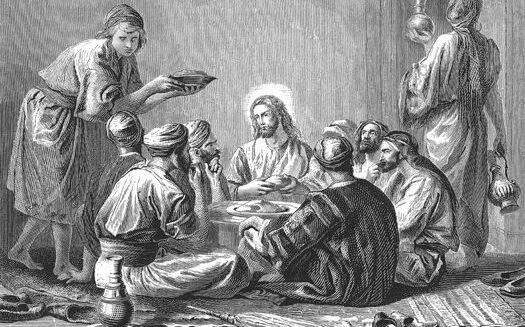
Salvation is the great theme of Scripture. If we can plot the biblical storyline as creation, fall, redemption, and consummation, then clearly it is that third act which dominates the pages of special revelation. Strictly speaking, the Bible details creation in two chapters (Genesis 1-2), the fall in one chapter (Genesis 3), and consummation in two chapters (Revelation 21-22). The other 1,184 chapters are about redemption.
Of course, in saying Christianity is about salvation, we do not mean that Christianity is about nothing but sin and salvation. The Bible is a big book full of many ideas, many promises, and many commands. And yet, if we are to do justice to the death and resurrection of Jesus—and to the apostolic preaching about that death and resurrection—we must affirm that Christianity is chiefly, firstly, ultimately, and amazingly a message about God’s gracious initiative to save sinful human beings.
The Story We Are Telling
What is the driving theme throughout the Bible? What is the point of Holy Week? What is the story we have to tell to the nations? How we assess the central plotline of redemptive history will define the Christianity we live and the Christ we proclaim. Is the Christian faith mainly the story of a cosmos to be renewed? A God to be obeyed? A mystery to be explored? A journey to be experienced? Or is the good news of the Bible most consistently, most frequently, and most significantly the story of sinners to be saved?
In a day where emphasizing the salvation of sinners is sometimes denigrated as too narrow and too unconcerned with the real needs of the world, we must not lose sight of the soteriological shape of the biblical storyline. Christ’s work to save helpless, hell-bound sinners is at the heart of the gospel and is the irreducible minimum of the apostolic message of the cross.
There is a reason that all four Gospels culminate with the death and resurrection of Jesus. No other biography spends a third of its time detailing the subject’s last week. But the Gospels are no ordinary biographies. They tell the story of victory in defeat, of triumph through tragedy. Make no mistake: the point of Jesus’s life was to die, the point of his death was to rise again, and the point of his resurrection was to justify believing sinners (Rom. 4:25). Upon seeing Jesus, John the Baptist announced, “Behold, the Lamb of God, who takes away the sin of the world!” (John 1:29). From even before his birth, the mission of the Christ was to save sinners. “You shall call his name Jesus,” the angel told Joseph, “for he will save his people from their sins” (Matt. 1:21). No wonder Jesus understood his own mission as coming “to seek and to save the lost” (Luke 19:10). “The Son of Man did not come to be served,” he told his disciples, “but to serve and to give his life as a ransom for many” (Mark. 10:45).
Christ and Him Crucified
To be sure, the work of Christ on the cross was multifaceted. In the death of Jesus, we have the conquering of evil, the defeat of Satan, and the example of perfect love. We can talk about more than sin and salvation when we talk about the cross, but we must not talk about less. For there is no good thing accomplished by the cross that was accomplished apart from the satisfaction of divine justice, the expiation of sin, and the propitiation of wrath.
If “evangelical” means anything worthwhile at all, it means that we are people who live and breathe and love and share the evangel. It means that our preaching never strays from Christ and him crucified (1 Cor. 1:23). It means that the most important thing about the most important message in the world is that Christ died for our sins in accordance with the Scriptures (1 Cor. 15:3).
The problem in the world is (and always has been) sin. The need of the hour is (and always has been) salvation. We believe in ethics. We believe in discipleship. We believe that salvation is unto holiness and for good works (Titus 2:14). And we also believe with all our might that God sent his only begotten Son into the world that whoever believes in him may not perish but have eternal life (John 3:16).
We do not teach correctly about Palm Sunday, Maundy Thursday, Good Friday, and Easter Sunday if we do not say something about the point of Christ’s passion week as an atoning sacrifice for sin. His death was a fragrant offering and sacrifice to God for our sins (Eph. 5:2; cf. Lev. 1:9, 13, 14). Christ gave himself for our sins (Gal. 1:4). He became sin for us (2 Cor. 5:21). He bore our sins in his body on the tree (1 Peter 2:24). He was pierced for our transgressions and crushed for our iniquities (Isa. 53:5-6). The work of the high priest was to offer gifts and offer sacrifices for sin (Heb. 5:1; 8:3), and Christ is the best and true and final high priest because through the eternal Spirit he offered himself without blemish to God (9:14).
The death of Christ is enough to win for us cleansing and appeasement, forgiveness and redemption. Sin is lawlessness (1 John 3:4), but because of Christ’s death, God is faithful and just to forgive us our sins and cleanse us from all unrighteousness (1:19). Christ’s sacrifice on the cross made purification for sin (Heb. 1:3), put away sin (9:26), and was a propitiation for sin (1 John 2:2). The One who loves us, the one who makes us a kingdom and makes us priests, is, we must always remember, the one who has freed us from our sins by his blood (Rev. 1:5-6).
God’s Salvation Story
We will not be Bible people—or Jesus people, or gospel people—if we are not salvation-for-sinners people. Though some may call it a soterian gospel or an individualistic gospel, the unavoidable reality of Scripture is that at the heart of the message of the cross is the simple, wonderful, glorious good news that Christ saves sinners like you and me. And if this message, and all that took place to accomplish what it announces, represents the climax of redemptive history—indeed, if all of history is about redemption—then we are right to conclude that this soteriological emphasis must shape the sound of our preaching, the priority of our ministry, and the mission of the church.
“The saying is trustworthy and deserving of full acceptance, that Christ Jesus came into the world to save sinners, of whom I am the foremost” (1 Tim. 1:15). That is the preaching that God blesses. That is that ministry that God uses. That is the mission that God has given us in the world. The mercy of God is the theme of our song because the salvation of sinners is the story of Scripture. Let us sing it, say it, and savor it—this week and for eternity.



